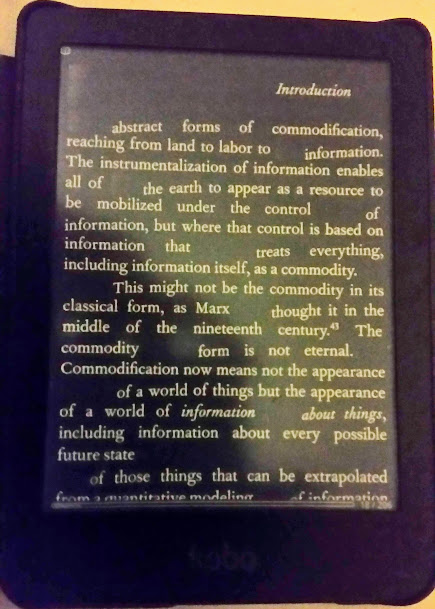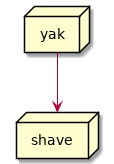- Coding. Looking at the notes from the week, it seems like hobby-time has mostly been related to working on my PKM / digital garden system (Flock) and tinkering around with Emacs. Coding and debugging in elisp, and tweaking a bit of the look of the site.
- Writing. Which is all totally fine – I enjoy it! And learn plenty in the process. But just a point to note that left unattended, my attention tends to go towards tweaking and coding, less towards writing. Although writing about what I’ve tweaked and coded still counts, right?
- Reading. I read New UK tech regulator to limit power of Google and Facebook, which made me think a bit about some principles for ethical technology and related praxis for the hacker class.
- Planning to re-read Hail the maintainers too.
- Only managed to catch a couple of talks from EmacsConf 2020, but nice to see such a good community around Emacs. For such a long-lasting program it seems very much alive and well.
- Enjoyed muchly The Central Memory – AI-assisted cyborb pop.
- I had a bit more of a play at getting knowledge maps in to my weeknotes, this time with an org-roam generated graph. It works as a nice easy-to-generate visual aide memoire for me, but sadly not really visually compelling for anyone else.
Author: Neil Mather
competition –> cooperation
consumer choice –> agency
growth –> sustainability

Why?
I use spacemacs a lot. For coding, for writing, for work, for organisation, for my personal knowledge management. It’s central to to most of my day-to-day activities on my computer. I’ve been using for maybe 4 years now, and have built up quite a mess of a configuration file with various tweaks over the years.
Given how much I use it, it seems sensible to give a bit of TLC to this configuration. I’ve tried to comment it as I’ve tweaked it, but it still has gotten messy. I’ve learned and copied a lot from other people’s configs, so endeavouring to make my own readable to others seems like a good thing to do.
I’m also just keen to try out org-babel for some literate coding, and this is an easy way in to doing that.
What I did
Here’s what I’ve done to get started on this.
File reorganisation
First off, I put my existing .spacemacs file into a folder structure where you can split it up into multiple files.
mkdir ~/.spacemacs.d cp ~/.spacemacs .spacemacs.d/init.el
In classic refactoring fashion – just do this simple thing, and make sure that things still work.
Extract out user-config into own file
OK, after that, the next refactoring was to move move everything in the user-config function out in to it’s own file, .spacemacs.d/user-config.el.
When its in its own file, you can source that from init.el like so:
(defun dotspacemacs/user-config () (let ((uc (concat dotspacemacs-directory "user-config.el"))) (message (concat "ds-d" dotspacemacs-directory)) (load-file uc)))
(above source came from here: Spacemacs configuration in a structured org-mode file : emacs)
Again, check that everything still works fine afterwards.
Move config into an org file and set up tangling on it
The section on Converting your existing config files in Literature Configuration was really helpful for this. It recommends a great path for moving things incrementally to the literate configuration. Essentially you start off with one huge source block, and gradually split that up in to smaller blocks with org-babel-demarcate-block.
I did that, putting each new source block in to a logical org heading, and adding a bit of description and narrative around them. Each time I split out a new bit, I ran org-babel-tangle to check things were still working.
I have the following config properties at the top of the file:
#+property: header-args:elisp :tangle ~/.spacemacs.d/user-config.el :comments org
which says for all the elisp source blocks in this file, combine them together in to user-config.el when I tangle the file. And also include my narrative as comments.
So my user-config is now literally all in My Spacemacs User Config here in my wiki. As in, that is the file that I use to generate my .spacemacs/user-config.el that spacemacs runs. (The source is here.)
I like it, and think it works pretty well for config files. I’m going to try it on my org-roam config next.
Resources
https://www.quantamagazine.org/the-thoughts-of-a-spiderweb-20170523/
- put together another 5tracks of bandcamp – 5tracks – week 46.
- I’m slowly rambling towards a regular writing practice of some kind. Thinking about a regular digital gardening practice and going to try and follow along with the Collector to Creator course.
- Reading more Capital is Dead. Digging it. Felt a call to action on how those with technical knowledge can work with others to help understand (and hopefully overcome) Vectoralism. Praxis for the hacker class?
- Read Informatics of the Oppressed article, also digging that.
- ^ Bit of a theme there between the two about Redistribution of informational wealth. Want to explore this more. Also how it may or may not link to Independent researcher.
- Thought briefly about Glitch and détournement.
- Starting playing Myst.
- Read a bit about Karrot (foodsharing software). Built with Vue. Nick Sellen works on it.
- In the absence of useful diagrams for now, I think I’ll just do random PlantUML art OK then

Taken together, these two historical moments can help us imagine new ways to organize information that threaten the capitalist status quo— above all, by facilitating the wide circulation of the ideas of the oppressed.

(I will be buying a proper copy, but the page on Verso books for it is an error page https://www.versobooks.com/books/3056-capital-is-dead)
- got interested in Agora
- made a few tweaks to my PKM (Flock) based on that
- Placing my daily logs in a journal subfolder
- start using person tag
- made a few tweaks to my PKM (Flock) based on that
- thought about my Music listening strategy and bought some tracks from Bandcamp
- was very happy that Trump lost
- watched a webinar on Independent researchers and Tools for thought.
- started reading about Ton’s PKM
- discovered I have an Antilibrary of articles
- thought a bit more about Vectoralism
- played around with PlantUML for weeknote diagrams. Got somewhere with it… but to be honest, might just be easier with LibreOffice :/

